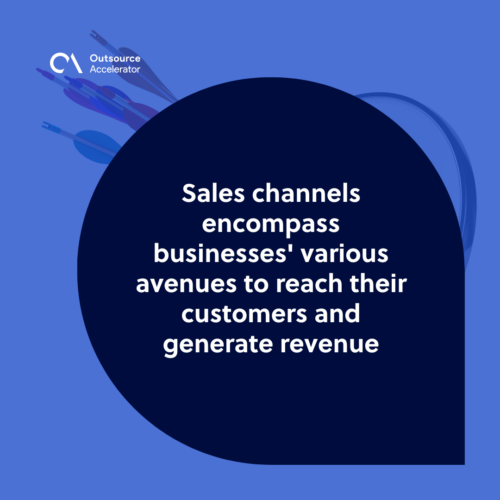Navigating sales channels: Path to business success

Sales channels are a vital component of any business strategy. These channels serve as pathways through which a company’s products or services reach customers.
Whether you’re a small business owner or a seasoned entrepreneur, understanding and harnessing the potential of sales channels can be a game-changer for your success.
In this article, we will delve into the concept of sales channels, their significance in driving business growth, and effective strategies for optimizing them.
Sales channels: Definition and importance
Sales channels encompass businesses’ various avenues to reach their customers and generate revenue. They can be broadly categorized into two main types: Direct sales channels and indirect sales channels.
Sales channels play a vital role in the success and growth of a business. Some of the benefits that can be gained from using sales channels include:
- Expanded market reach
- Diversified revenue streams
- Enhanced customer relationships and satisfaction
- Improved brand visibility and recognition
- Potential cost savings and efficiencies
These advantages will be discussed in more detail in the later sections of this article.
Sales channels are critical pathways that help businesses reach their customers, generate revenue, and foster growth. Recognizing the importance of sales channels empowers service providers to strategically select and optimize their sales strategies.
By harnessing the power of sales channels, businesses can expand their market reach, diversify their revenue streams, enhance customer relationships, and elevate their brand presence in the marketplace.

Direct sales channels
Direct sales is a subdivision of sales channels that involve direct interaction between the company and the customer.
Examples of direct sales channels include company-owned e-commerce websites, brick-and-mortar retail stores, and sales teams that engage with customers face-to-face or over the phone.
Using direct sales strategies gives plenty of advantages, such as:
- Increased control over customer experiences
- Gathering first hand customer feedback
- Stronger customer relationships
- Enhanced brand positioning
- Better opportunities for upselling and cross-selling
While businesses in almost any industry can utilize direct sales, there are several sectors where it is particularly prevalent.
Some industries that typically employ direct sales strategies include:
- Health and wellness
- Consumer goods
- Home improvement
- Financial services
- Technology
- Education and training
- Travel and hospitality
Indirect sales channels
Indirect sales are a powerful strategy for businesses to reach a wider audience and expand their market reach.
In this approach, companies rely on third-party entities to act as intermediaries, facilitating the distribution and sale of their offerings to the target market.
These intermediary channels can take various forms, such as distributors, wholesalers, resellers, agents, or online marketplaces.
One key advantage of indirect sales is the ability to scale rapidly. Rather than investing significant resources in building and managing a direct sales force, firms can leverage the infrastructure and capabilities of intermediaries who are already well-positioned in the market.
This approach enables businesses to quickly enter new geographic regions, access niche markets, or penetrate industries where they may have limited expertise or presence.
Businesses operating in the following industries typically use indirect sales channels:
- Consumer electronics
- Automotive
- Fast-moving consumer goods (FCMG)
- Pharmaceuticals
- Food and beverage
- Industrial equipment and machinery
- Software and technology services
- Business services
Popular sales channels in various industries
As stated earlier, companies use different sales channels in their marketing strategies to maximize their reach, engage with diverse customer segments, and optimize their sales efforts.
Below are examples of commonly used sales channels in different industries.
E-commerce platforms
E-commerce platforms provide unparalleled access to a global customer base. With the power of the internet, companies can break the barriers of physical location and reach customers beyond their local markets.
Firms can expand their market reach exponentially and tap into new regions by setting up an online store or partnering with established e-commerce marketplaces.
Another reason for the popularity of e-commerce platforms as a sales channel is 24/7 availability.
Unlike traditional brick-and-mortar stores with limited operating hours, e-commerce platforms enable businesses to be available to customers around the clock.
This accessibility empowers customers to browse, shop, and make purchases at their convenience, irrespective of time zones.
Retail stores
While the rise of e-commerce has transformed the retail landscape, brick-and-mortar stores continue to play a vital role in businesses’ sales strategies.
From personalized customer experiences to immediate product availability, retail stores offer unique advantages that contribute to business success and customer satisfaction.
One of the key advantages of retail stores is the ability to provide customers with a tangible shopping experience. Unlike online shopping, physical stores allow customers to touch, feel, and try products before making a purchase.
This sensory experience can be particularly important for products such as clothing, furniture, or electronics, where customers value the ability to assess quality, fit, or functionality firsthand.
Distributors and wholesalers
In the realm of sales channels, distributors and wholesalers play a pivotal role in the success of many businesses.
By partnering with distributors and wholesalers, businesses can significantly extend their market reach. These intermediaries have established networks and relationships with retailers – allowing companies to tap into their distribution channels and reach a wider customer base.
Distributors and wholesalers often have a well-established presence in specific regions or industries, enabling businesses to access markets that would otherwise be challenging to enter.
Further, they have robust infrastructure and operational capabilities, including warehousing facilities, efficient inventory management systems, and streamlined order fulfillment processes.

Online marketplaces
One of the primary advantages of online marketplaces is the ability to access a vast customer base and expand market reach.
These platforms attract millions of users actively seeking products or services, giving businesses a ready audience to showcase their offerings.
Online marketplaces provide significant brand visibility opportunities. By listing products on popular online marketplaces, businesses can tap into a global or niche market, reaching customers who may not have discovered them through traditional marketing channels alone.
This sales channel often employs various marketing techniques, including featured listings, recommendations, and personalized product suggestions. These further enhance brand visibility and increase the likelihood of customer discovery.
Business-to-business (B2B) sales
Business-to-business (B2B) sales play a critical role in the success of many businesses. B2B sales often present higher revenue potential than business-to-consumer (B2C) sales.
The nature of B2B transactions typically involves larger order volumes, higher price points, and longer-term contracts. These factors contribute to increased revenue streams for businesses.
B2B sales foster long-term partnerships and customer relationships. Unlike individual consumers who make sporadic purchases, businesses often require consistent and reliable suppliers or service providers.
By establishing strong B2B relationships, companies can secure repeat business and build customer loyalty.
Direct sales force
One of the primary advantages of a direct sales force is the ability to provide personalized customer interactions. Unlike other sales channels, a direct sales force allows organizations to interact face-to-face with potential customers.
This personalized approach enables businesses to understand customer needs, build rapport, address concerns, and tailor their offerings to meet specific requirements.
By fostering personal connections, companies can establish trust and enhance the overall customer experience.
Another advantage of a direct sales force is that it offers businesses the flexibility to adapt their sales strategies in real time. Sales representatives can quickly respond to customer feedback, market trends, and competitive challenges.
They have the ability to adjust their sales approach, pitch, or pricing to meet the specific needs of individual customers or market segments.
Online subscription models
Online subscription models have gained significant popularity among businesses in recent years.
One of the primary advantages of online subscription models is the creation of predictable revenue streams. By offering products or services on a subscription basis, companies can forecast their revenue with greater accuracy.
Subscriptions provide a recurring income source, reducing the reliance on one-time transactions. This predictability allows businesses to plan and allocate resources more effectively, make informed decisions, and invest in future growth.

Benefits of utilizing sales channels
When it comes to selling products or services, businesses have a variety of sales channels at their disposal. These sales channels serve as pathways that connect companies with their target customers and facilitate the process of generating sales.
Read on below to learn more about the numerous benefits of utilizing sales channels.
1. Expanded market reach and customer accessibility
Utilizing sales channels allows organizations to expand their market reach beyond their immediate geographical location.
By leveraging different sales channels such as e-commerce platforms, retail stores, or distributors, businesses can tap into new markets, target diverse customer segments, and reach a wider audience.
This expanded market reach presents opportunities for increased brand exposure, customer acquisition, and revenue growth.
2. Diversification and risk mitigation
Taking advantage of multiple sales channels enables firms to diversify their revenue streams and mitigate risks associated with relying on a single channel.
By spreading sales across different channels, businesses reduce their dependence on a single market or customer segment.
This diversification helps companies navigate market fluctuations, changes in consumer behavior, or disruptions in specific channels, ensuring a more stable revenue stream and safeguarding against potential risks.
3. Improved customer service and satisfaction
Sales channels contribute to customer convenience and accessibility, which in turn drives increased sales and revenue.
Different customers have distinct preferences when it comes to shopping, whether it’s online or in physical stores. Offering various sales channels provide a seamless buying experience.
This convenience and accessibility result in higher customer satisfaction, repeat purchases, and increased sales and revenue.
Optimizing customer interactions often involves specialized support. Partnering with experienced providers like Clark Staff for customer service agents can ensure seamless, high-quality support across all your sales channels
4. Enhanced brand visibility and recognition
Sales channels allow organizations to engage in targeted marketing and communication strategies. Each channel attracts a specific customer segment with unique preferences, interests, and needs.
By tailoring marketing messages and brand communication to align with the specific channel and its audience, businesses can effectively engage and resonate with their target customers.
This targeted approach helps create a stronger brand connection, increases brand recall, and contributes to enhanced brand visibility.
5. Potential for cost savings and operational efficiencies
By reaching a larger customer base through various channels, businesses can increase their sales volume, leading to higher production volumes and reduced per-unit costs.
This bulk production and distribution can drive down costs associated with manufacturing, packaging, transportation, and other operational expenses.
Additionally, sales channels provide opportunities for shared marketing and advertising costs. For instance, partnering with distributors or retailers allows businesses to benefit from their marketing efforts and promotional activities.
Sharing marketing expenses with channel partners helps in reducing the burden of marketing costs compared to executing standalone marketing campaigns. This collaborative approach optimizes marketing investments and enhances cost efficiency.







 Independent
Independent




